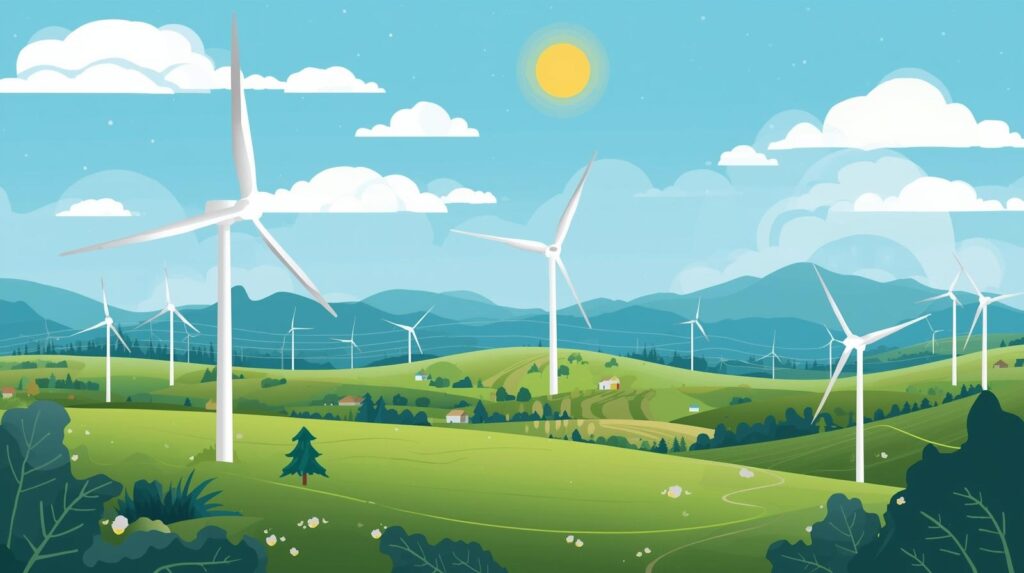As the world increasingly turns its attention to sustainable energy solutions, wind energy has emerged as a prominent player in the global energy landscape. Known for its renewable nature and minimal environmental impact, wind energy offers a plethora of economic advantages that make it an attractive option for countries aiming to reduce their carbon footprint and stimulate economic growth. In this article, we will explore the economic advantages of wind energy development, shedding light on why businesses and governments alike are investing in this promising energy source.
Understanding Wind Energy
Wind energy harnesses the power of the wind to generate electricity through wind turbines. These turbines capture the kinetic energy of wind and convert it into mechanical power, which is then transformed into electricity. As a renewable resource, wind energy is abundant and inexhaustible, making it a key component of the global push towards cleaner energy alternatives.
Advantages of Wind Energy
Wind energy offers several compelling advantages that have led to its widespread adoption around the world. Below, we delve into some of the most significant economic benefits associated with wind energy development.
Job Creation and Economic Growth
One of the most notable economic advantages of wind energy is its potential to create jobs and stimulate economic growth. The construction, installation, and maintenance of wind farms require a diverse workforce, ranging from engineers and construction workers to technicians and administrative staff. According to the Global Wind Energy Council, the wind sector employs over 1.2 million people worldwide, a number that is expected to grow as more countries invest in wind energy infrastructure.
Moreover, wind energy development can revitalize local economies by attracting investment and generating revenue. Wind farms often bring new business opportunities to rural areas, boosting local economies through increased demand for goods and services.
Energy Independence and Security
Wind energy can also enhance energy independence and security for countries that invest in its development. By reducing reliance on imported fossil fuels, countries can decrease their vulnerability to global energy market fluctuations and potential supply disruptions. This enhanced energy security translates into a more stable economic environment, which is conducive to long-term growth and development.
Cost Competitiveness
The cost of wind energy has decreased significantly over the past decade, making it increasingly competitive with traditional energy sources such as coal and natural gas. Technological advancements in turbine design and manufacturing have contributed to this cost reduction, enabling wind energy to offer a cost-effective alternative to conventional energy sources.
In many regions, wind energy is now the cheapest source of new electricity generation, providing an economically viable option for meeting growing energy demands. As the cost of wind energy continues to decline, its economic advantages will become even more pronounced.

Environmental Benefits and Cost Savings
Wind energy is a clean energy source that produces no greenhouse gas emissions during operation. This environmental advantage translates into economic benefits by reducing the costs associated with air pollution and climate change mitigation. By investing in wind energy, countries can lower healthcare costs related to air pollution and avoid the economic impact of climate-related disasters.
Limitations of Wind Energy
While wind energy offers numerous advantages, it is important to acknowledge its limitations. Understanding these challenges allows for a more balanced perspective on the potential of wind energy as a sustainable energy solution.
Intermittency and Reliability
One of the primary limitations of wind energy is its intermittency, as wind is not always available at a constant rate. This variability can pose challenges to grid reliability and stability, requiring the integration of energy storage solutions and complementary energy sources to ensure a consistent power supply.
Land Use and Environmental Impact
Wind farms require significant land areas, which can lead to land use conflicts and concerns about their impact on local ecosystems. While wind energy is generally considered environmentally friendly, the construction and operation of wind farms can affect wildlife and natural habitats.
Balancing the need for renewable energy development with environmental conservation is crucial to addressing these concerns.
The Future of Wind Energy
The economic advantages of wind energy, combined with its environmental benefits, make it a compelling choice for future energy strategies. As technology continues to advance and costs decline, wind energy is poised to play an increasingly important role in the global energy mix.
Strategic Considerations for Business Leaders
For Chief Technology Officers, Business Strategists, and Innovation Managers, understanding the economic implications of wind energy is essential for making informed decisions about energy investments. By integrating wind energy into their strategic plans, businesses can enhance their sustainability efforts, reduce operational costs, and position themselves as leaders in the transition to a low-carbon economy.
Conclusion
The economic advantages of wind energy development are clear and compelling. From job creation and energy independence to cost competitiveness and environmental benefits, wind energy offers a sustainable path to economic growth and stability. By embracing the potential of wind energy, businesses and governments can drive innovation and foster a more sustainable future for generations to come.
In summary, wind energy is not only an environmentally responsible choice but also an economically advantageous one. As the world continues to prioritize sustainable energy solutions, wind energy will undoubtedly remain a key player in the global energy transition.




